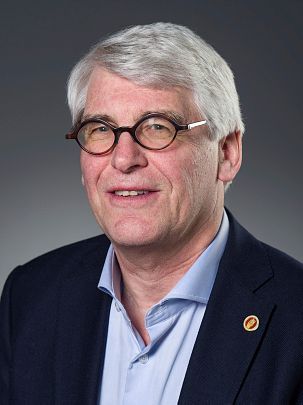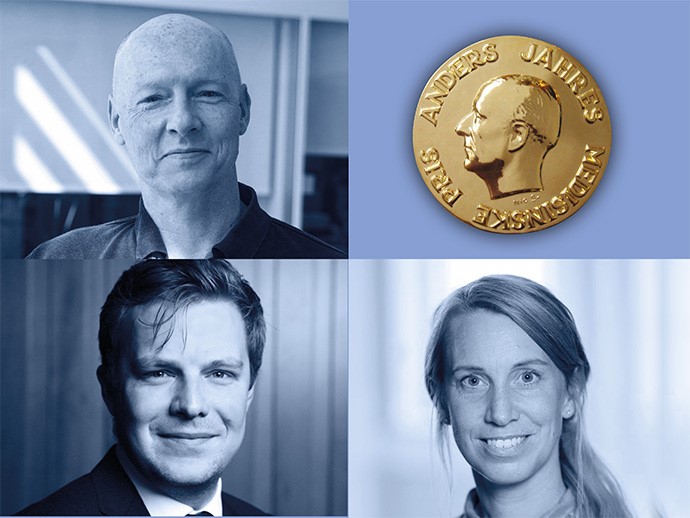
Welcome to this year's annual Jahre Award ceremony and lectures
The Anders Jahre’s Award for Medical Research is one of the oldest, biggest and most prestigious medical research awards in the Nordic region. The Jahre lectures that are delivered by the prize winners prior to the award ceremony provide a golden opportunity to hear the cream of the crop speaking about their fields. This year, the lectures in the professor's residence were fully booked in record time.
The Jahre Awards from 2022 will go to researchers and research fields in basic cancer research, research on metabolic changes in cancer and diabetes, and treatment of cardiac arrest.
I would recommend students and interested researchers to attend the award ceremony on 3 November, which still have available places. It is a great event that is an experience to attend.
Ludvig Sollid has chaired the committee's work in finding this year's award winners. Anne Simonsen is acting chair this autumn. The other members of the committee represent each of the other Nordic countries. The faculty would like to thank the committee, which as usual has performed rigorous and well-thought-out assessment work.
This year’s award winners

The main award goes to Harald Stenmark
The Anders Jahre Award for Medical Research and NOK 1 million will go to Professor Harald Stenmark from the Faculty of Medicine at the University of Oslo, who receives the award for his groundbreaking studies on processes in cell membranes and how incorrect regulation of such processes influences cancer development.
When trying to understand the cellular processes that gradually transform normal cells into cancer cells, most focus has been directed at changes in DNA and signalling pathways that control cell proliferation and survival. In Stenmark's Lab, they have researched how changes in the cell's membrane systems can contribute to the development of cancer. Among other things, they have revealed how changes in the cell's membranes can contribute to DNA damage and increased invasion ability. They have also found that some of the proteins that regulate cellular membranes may be promising points of attack for targeted cancer treatment.
The dynamic rearrangements of cellular membranes therefore control processes that prevent normal cells from being transformed into cancer cells, and such dysregulation of cellular membrane dynamics is indeed often involved in cancer progression. Stenmark and his colleagues have investigated the molecular biology of membrane dynamics that control genome integrity, signal transduction, nutrient uptake, metabolism, survival and invasion, with particular emphasis on phosphorylated membrane lipids. This has led to the discovery of new molecules that either inhibit or accelerate cancer progression.
Harald Stenmark heads our Norwegian Centre of Excellence, CanCell – Centre for Cancer Cell Reprogramming.
Sylow and Andersen share the Award for younger researchers
Anders Jahre's award for young researchers is NOK 400,000 and is shared this year between Associate Professor Lykke Sylow from the Department of Nutrition, Exercise and Sports at the University of Copenhagen and Associate Professor Lars Wiuff Andersen from the Institute of Clinical Medicine at Aarhus University.
Associate Professor Lykke Sylow receives the award for her outstanding studies of the molecular metabolic causes of muscle loss in cancer and type 2 diabetes. Sylow has studied how insulin and exercise regulate muscle mass and the conversion of sugar in the body. The molecular insight from her research has, among other things, provided a better understanding of the connection between lack of sensitivity to insulin and loss of muscle mass.
In her research, Sylow focuses on clarifying the molecular causes of muscle loss and associated metabolic dysfunctions. She and her colleagues are trying to identify mechanisms at the molecular level that control muscle mass, function and metabolism. Their most central contribution to the field is the discovery of a new signalling pathway, via Rho GTPase, which controls insulin sensitivity in the skeletal muscles of patients with type 2 diabetes.
When studying muscle loss and insulin resistance as central features of cancer, ageing and diabetes, features of the pathology of these conditions are revealed at the molecular level. It was a breakthrough when Sylow helped demonstrate that cancer causes changes in distant tissues, such as skeletal muscle. In fact, cancer can make the muscle resistant to insulin and lead to muscle loss. This reduces quality of life and survival.
Since exercise has so many beneficial effects on our health, she also focuses on how muscle loss and metabolic abnormalities can be improved or even reversed by exercise.
Associate Professor Lars Wiuff Andersen receives the award for his outstanding studies on the treatment of cardiac arrest. Together with his colleagues, he has contributed fundamental new knowledge in this field and his findings have, among other things, led to changes in the recommendation for emergency treatment in cardiac arrest.
Cardiac arrest affects millions of people every year. Despite improvements in outcomes over the past 20 years, results remain poor. Only 15-30% of those who suffer a cardiac arrest are alive 30 days later. The objective of Andersen's research group is to improve these figures. Andersen aims to achieve this through clinical research that spans the entire range from observational studies and synthesis of existing literature, to large randomized multicentre studies. Andersen and his colleagues focus on all aspects of the course of the disease, from immediate help given by bystanders, drugs given by clinicians during the cardiac arrest, and more advanced treatments during and after the cardiac arrest.
The Scope of modern medical research
This year's awards show some of the range in modern medical research, from typical basic research to translational research and clinically applied research. In each field, this year's awards shows that the Anders Jahres awards for medical research honour outstanding researchers in key medical research fields. Welcome!